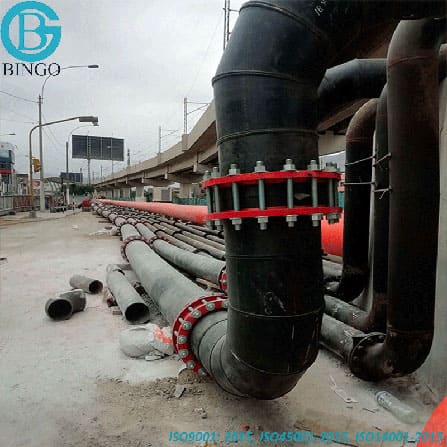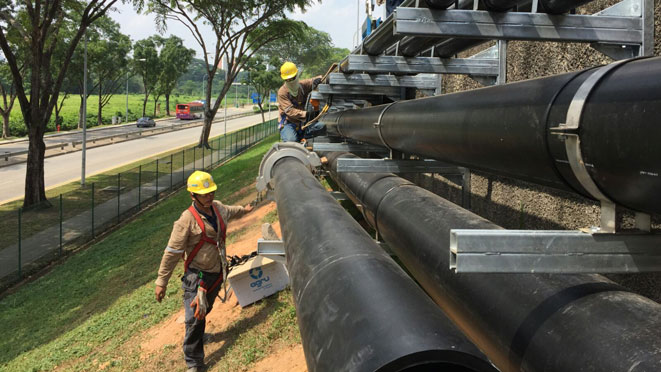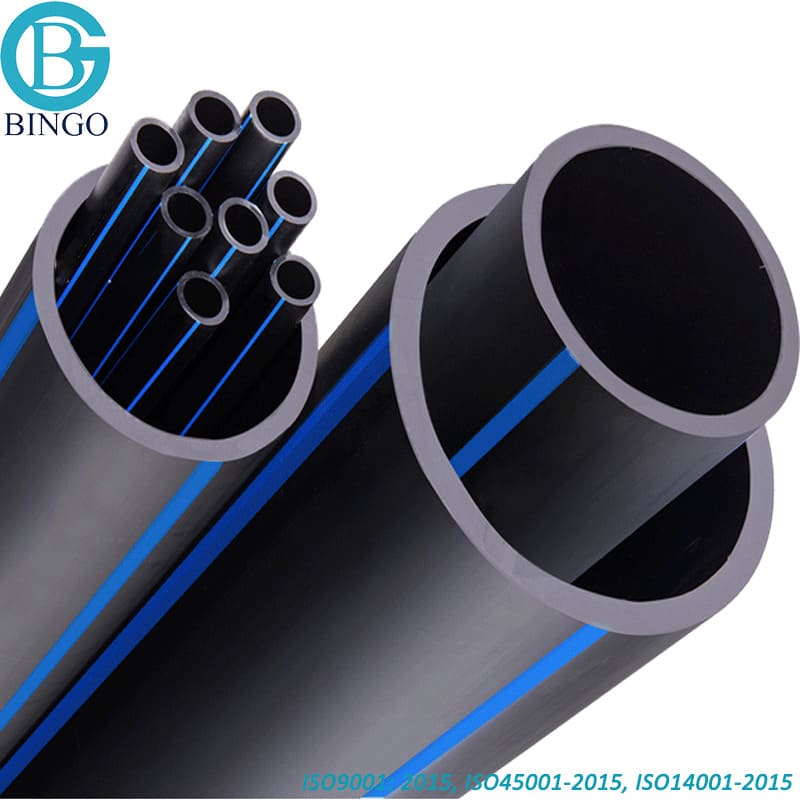Exploring the Leading Pipeline Manufacturers: High Quality, Reliability, and Advancement
The pipeline manufacturing industry stands at the junction of integrity, innovation, and quality, driven by leading firms such as Tenaris and Vallourec. These manufacturers are not only devoted to creating high-performance materials however are additionally introducing lasting techniques that resolve modern ecological issues (Pipeline Manufacturer). As we examine the requirements that specify excellence in pipeline options, it becomes noticeable that the landscape is rapidly evolving. What specific advancements are emerging, and just how are these advancements forming the future of pipeline framework? The responses may redefine industry requirements in methods that are not yet completely recognized
Leading Manufacturers Introduction
In the domain of pipeline manufacturing, several key gamers become leaders, each contributing considerably to the industry's landscape. Firms such as Tenaris, Vallourec, and JFE Steel have actually established themselves as frontrunners by consistently supplying high-quality products that satisfy rigorous market standards. Tenaris, renowned for its innovative solutions, concentrates on smooth and welded pipes, catering mainly to the oil and gas field. Vallourec, a French international, concentrates on the manufacturing of costs tubular options, stressing sustainability and advanced technology in its manufacturing procedures.
JFE Steel, a major Japanese manufacturer, is identified for its substantial variety of steel pipelines, especially those utilized in power and infrastructure jobs. Their dedication to study and growth has actually allowed them to create high-performance products that stand up to harsh ecological problems. Additionally, companies like U.S. Steel and National Oilwell Varco have actually increased their market existence by expanding their item offerings and enhancing operational effectiveness.
These leading manufacturers not only control the marketplace but additionally drive technology within the sector, establishing standards for high quality and integrity that players desire accomplish. Their contributions are essential for satisfying the boosting need for sturdy and reliable pipeline solutions worldwide.
Requirements for High Quality Evaluation
Quality analysis in pipeline manufacturing rests on two important standards: product resilience criteria and producing procedure efficiency. Ensuring that products meet rigorous durability criteria is crucial for the long life and integrity of pipelines. In addition, maximizing the manufacturing procedure can boost efficiency while preserving high quality, ultimately affecting overall efficiency and safety.
Product Sturdiness Standards
Assuring the longevity and reliability of pipeline products is crucial for keeping infrastructure stability and operational effectiveness. Product resilience standards play an important duty in reviewing the top quality of pipes, determining the efficiency and life-span of the materials utilized in building. Manufacturers have to comply with a variety of strenuous requirements, consisting of those set by companies such as ASTM International and the American Oil Institute (API)
These standards review numerous elements, consisting of corrosion resistance, tensile toughness, and fatigue performance. Pipes utilized in corrosive settings call for products that can endure chemical degradation, while those subjected to high-pressure conditions must show outstanding tensile strength.
In addition, aspects such as temperature variations and ecological problems must be thought about, as these can substantially affect product actions in time. Manufacturers often make use of advanced testing techniques, including sped up aging tests, to imitate long-lasting wear and assurance that products go beyond or satisfy sector benchmarks.
Manufacturing Process Effectiveness
Manufacturers' capacity to optimize making procedure efficiency is crucial for creating premium pipelines that meet rigorous sector standards. Performance in making straight influences expense administration, manufacturing timelines, and general item stability. To achieve this, leading pipeline manufacturers implement innovative methods such as lean manufacturing, automation, and real-time information analytics.
Lean making concepts are vital in decreasing waste and making the most of resource utilization. By streamlining processes and eliminating redundancies, suppliers can improve productivity while making sure constant top quality. Automation innovations, including robotics and computer mathematical control (CNC) devices, play a crucial role in improving accuracy and reducing human error, thereby raising the reliability of the last product.
In addition, using real-time information analytics enables suppliers to keep an eye on production procedures constantly, allowing them to recognize traffic jams and make timely changes. This positive method not just enhances performance however additionally sustains quality control procedures by ensuring compliance with regulatory criteria.
Reliability in Pipeline Solutions
Dependability in pipeline services is vital, as it straight affects the security and effectiveness of liquid transportation systems. Secret factors consist of the sturdiness of materials used, adherence to rigorous testing and certification standards, and the consolidation of cutting-edge product solutions that improve efficiency. Recognizing these components is essential for producers intending to provide reputable pipeline infrastructure.
Significance of Sturdiness
Attaining resilience in pipeline options is important, as it straight influences the long-term efficiency and safety and security of infrastructure. Durable pipes are essential for decreasing upkeep costs and lowering the possibility of devastating failings. This integrity is especially crucial in markets such as oil and gas, water system, and wastewater management, where the consequences of pipeline failure can be serious, both economically and eco.
The materials and manufacturing procedures utilized by pipeline suppliers play a considerable function in establishing the sturdiness of the end product. Making use of top notch basic materials, progressed modern technologies, and ingenious style principles assures that pipelines can hold up against different stressors, including pressure fluctuations, temperature variants, and destructive environments.
Moreover, the resilience of pipes is closely linked to their capacity to withstand external variables such as soil motion, seismic task, and chemical exposures. Reliable deterioration defense approaches, such as finishes and cathodic defense, even more improve the longevity of pipes, securing them against degeneration with time.
Purchasing long lasting pipeline options eventually converts to increased operational efficiency, minimized downtime, and boosted security, affirming the critical importance of resilience in contemporary pipeline manufacturing.
Checking and Accreditation Standards
In the domain of pipeline solutions, strenuous testing and certification requirements are crucial to assure the dependability and safety and security of infrastructure. These standards serve as criteria for reviewing the efficiency and resilience of pipeline products and systems, verifying they fulfill specific regulatory and market needs.
Checking processes generally include various methodologies, consisting of stress screening, hydrostatic analyses, and non-destructive screening strategies. These assessments are important for recognizing prospective weaknesses or problems in the materials before they are deployed in real-world applications. Additionally, certification by acknowledged companies assurances that manufacturers abide by established standards, which cultivates trust fund amongst stakeholders, including designers, end-users, and contractors.
Several leading pipeline makers take part in continual surveillance and improvement of their screening procedures to adjust to developing industry standards and technological advancements. Conformity with requirements such as ASTM, ASME, and ISO not only boosts product integrity yet likewise minimizes the risk of environmental occurrences related to pipeline failings.
Ingenious Product Solutions
The development of cutting-edge material remedies has changed the landscape of pipeline manufacturing, improving both performance and sturdiness. Advanced materials such as high-density polyethylene (HDPE), cross-linked polyethylene (PEX), and composite materials have actually emerged as game-changers, providing superior resistance to corrosion, temperature changes, and stress variants. These products not just extend the life-span of pipes however additionally reduce upkeep expenses, making certain trusted lasting performance.
Manufacturers are progressively adopting wise products that integrate sensors for real-time surveillance. This innovation enables proactive upkeep, substantially enhancing reliability by identifying leaks or structural weak points before they rise right into essential failures. The integration of nanotechnology has additionally resulted in the development of layers that boost the toughness of pipes against abrasion and chemical direct exposure.
Sustainability is another crucial emphasis, with producers discovering bio-based compounds and recyclable materials that reduce environmental effect. As regulatory criteria proceed to progress, the focus on cutting-edge product solutions ends up being paramount in conference rigid security and environmental needs. Ultimately, these advancements not just enhance the dependability of pipeline systems yet also contribute to the overall performance and sustainability of power transportation facilities.
Advancements in Pipeline Innovation
Developments in pipeline innovation are reinventing the industry by improving performance, safety, and ecological sustainability. Recent advancements focus on clever pipeline systems that use sensing units and IoT innovation to monitor conditions in real time, allowing proactive maintenance and reducing the risk of failures. These systems can discover leaks, pressure adjustments, and other anomalies, permitting for quick response and decreasing environmental influence.
In addition, the development of sophisticated materials, such as composite and corrosion-resistant alloys, substantially prolongs the life-span and integrity of pipelines. HDPE Pipe Supplier (American Plastics LLC HDPE Pipeline Manufacturer). These materials minimize upkeep expenses and boost performance in severe environments, making them perfect for water, oil, and gas transportation
Automation and robotics are playing an essential function browse around these guys in pipeline building and examination. Drones and robotic tools help with studies and analyses of hard-to-reach areas, guaranteeing complete examinations without jeopardizing safety and security.
Ingenious styles, such as modular pipeline systems, enable for higher adaptability in installation and adjustment, catering to the vibrant needs of the power industry. With each other, these technical improvements not just improve operational effectiveness however also add to an extra resilient and sustainable pipeline framework, leading the way for a greener future.
Case Researches of Success
Across various markets, effective applications of sophisticated pipeline technologies demonstrate considerable improvements in operational efficiency and safety. One noteworthy case is the deployment of clever pipeline monitoring systems in the oil and gas industry, where real-time information analytics have actually minimized leak discovery times by over 50%. This not only reduces ecological risks but also boosts the general honesty of pipeline infrastructure.

Furthermore, a major manufacturer implemented robotic assessment innovations in its pipeline upkeep procedures, leading to a 40% enhancement in assessment effectiveness. This technique has streamlined maintenance timetables and substantially decreased downtime.
These instance researches highlight just how leading pipeline suppliers are leveraging innovative innovations to cultivate integrity and functional quality, ultimately setting brand-new standards for the sector. As these successes remain to unravel, they lead the way for more advancements in pipeline manufacturing and monitoring.

Ecological Sustainability Practices
Frequently, pipeline manufacturers are prioritizing ecological sustainability practices to mitigate their ecological footprint and boost the longevity of their products. This dedication is mirrored in various campaigns aimed at lowering waste, saving power, and using lasting materials throughout the manufacturing procedure.

Many makers are taking on sophisticated technologies that lessen emissions and energy intake. As an example, the integration of automated systems and energy-efficient machinery aids simplify production while reducing reliance on nonrenewable fuel sources. In addition, companies are progressively transforming to environment-friendly products, such as recycled metals and bioplastics, which not just lower the environmental effect however additionally promote a round economic climate.
Pipeline producers are applying rigorous lifecycle assessments to assess the environmental implications of their products from creation to disposal. This method enables them to recognize chances for improvement and foster liable sourcing and waste monitoring practices.
Partnership with ecological organizations better improves these initiatives, as producers seek to align their procedures with international sustainability objectives. Eventually, these environmental sustainability methods not only add to a healthier planet however likewise setting producers as liable leaders in the sector, attracting ecologically mindful stakeholders and customers alike.
Future Fads in Pipeline Manufacturing
As the need for much more reliable and sustainable framework grows, pipeline manufacturing is positioned for significant innovations that will reshape the industry. Secret fads anticipated in the coming years include the assimilation of advanced materials, such as composite and corrosion-resistant alloys, which enhance durability while lessening ecological impact. Manufacturers are also expected to embrace innovative production methods, like additive manufacturing and automation, to simplify procedures, reduce waste, and lower expenses.
Moreover, the surge of smart pipeline innovations, including sensing units and IoT tools, will certainly make it possible for real-time surveillance and anticipating maintenance, thus enhancing security and functional effectiveness. This electronic improvement will not just maximize source administration but also promote conformity with strict environmental guidelines.
Sustainability will certainly continue to be a main focus, driving makers to purchase green techniques, consisting of energy-efficient production approaches and reusing campaigns. As the worldwide emphasis on climate change heightens, pipeline makers will need to adapt by creating remedies that satisfy both ecological and economic needs.
Often Asked Questions

What Industries Largely Utilize Pipeline Products From These Manufacturers?
Pipeline items are primarily utilized in sectors such as oil and wastewater, gas and water management, chemical mining, construction, and processing. These sectors rely upon effective, sturdy, and safe transportation of liquids and products.
Exactly How Do Manufacturers Make Certain Compliance With International Pipeline Specifications?
Manufacturers ensure compliance with worldwide pipeline requirements by carrying out strenuous quality control procedures, performing normal inspections, adhering to recognized regulative frameworks, and purchasing worker training to promote recognition and understanding of safety and security and top quality needs.
What Is the Ordinary Life-span of Pipelines From Leading Manufacturers?
The ordinary life-span of pipes from leading suppliers typically varies from 30 to 100 years, relying on product, environmental conditions, and maintenance practices. American Plastics LLC HDPE Pipe Solutions. Routine assessments and adherence to market standards considerably influence long life and efficiency
Are There Certifications Particular to Pipeline Manufacturing Top Quality?
Yes, different certifications exist for pipeline making high quality, including ISO 9001 for top quality administration systems and API standards certain to pipes. These qualifications guarantee adherence to rigorous safety, efficiency, and ecological standards within the sector.
Just How Do Manufacturers Handle Pipeline Upkeep and Fixes?
Manufacturers normally implement an aggressive upkeep technique that consists of routine assessments, keeping an eye on systems for early discovery of problems, and an organized repair work procedure. This approach assurances pipeline honesty, reduces downtime, and improves total operational efficiency.
Quality assessment in pipeline manufacturing hinges on 2 vital standards: material longevity standards and making process effectiveness - HDPE Pipe Supplier. Material toughness criteria play an essential duty in evaluating the high quality of pipes, determining the performance and life expectancy of the products made use of in construction. The materials and manufacturing processes utilized by pipeline makers play a significant function in determining the resilience of the last item. The average life-span of pipes from leading manufacturers usually varies from 30 to 100 years, depending on material, environmental conditions, and maintenance methods. Yes, different accreditations exist for pipeline producing high quality, consisting of ISO 9001 for high quality administration systems and API requirements particular to pipelines